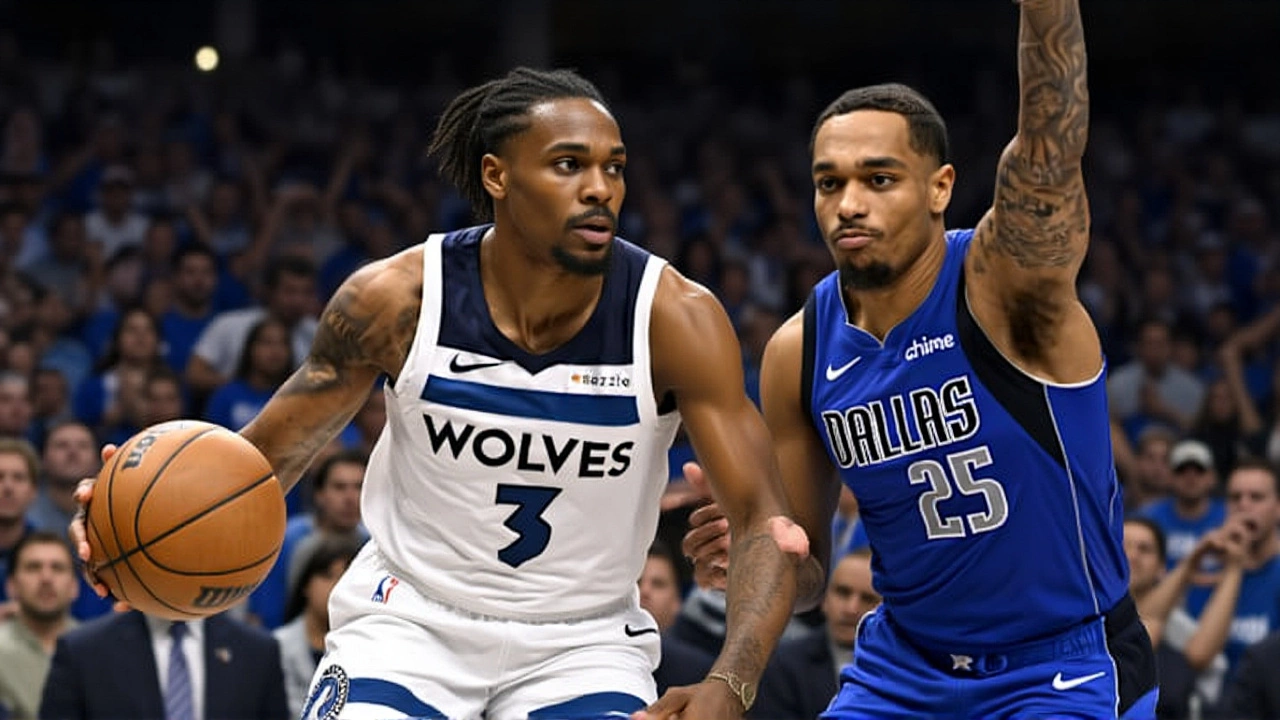
The Minnesota Timberwolves are set to welcome the struggling Dallas Mavericks to Target Center in Minneapolis on Monday, November 17, 2025, at 8:00 p.m. ET — a game that could define momentum for both teams in the middle of the 2025-2026 NBA seasonMinneapolis. With Minnesota sitting at 8-5 and Dallas languishing at 4-10, the spread isn’t just wide — it’s a chasm. Sportsbooks list the Timberwolves as 14- to 14.5-point favorites, with moneyline odds hovering around -900 for Minnesota and +600 for Dallas. But the real story isn’t just the numbers. It’s whether Dallas can defy logic, or if Minnesota’s home rhythm will keep rolling — and how their defensive flaws might be exposed.
Conflicting Times, Same Reality
Oddly enough, the game’s start time has sparked confusion. Fox Sports 710 and Team Rankings say Monday at 8 p.m. ET. Action Network lists it as Tuesday at 1 a.m. — which, technically, is still Monday night in Minnesota. Leans.ai says 9 p.m. EST. The discrepancy doesn’t change the stakes. What matters is that the Mavericks are flying across time zones after playing in Denver on Saturday, then in Phoenix on Sunday. They’re on a third game in four nights — a brutal stretch that’s worn down even the toughest teams. And they’re facing a Timberwolves squad that thrives at home, especially when opponents are fatigued.
Why the Spread Is So Wide — And Why It Might Not Matter
Minnesota’s 8-5 record looks solid, but their offense has been uneven. They score efficiently in spurts, then go silent for stretches. Their defense? Built to force opponents into mid-range jumpers — the kind of shots the Mavericks simply can’t make consistently. According to Action Network, Dallas ranks 24th in the league in pull-up jumpers, the exact type of shot Minnesota’s drop coverage invites. That’s not a coincidence. Chris Finch’s system is designed to let shooters go one-on-one while protecting the rim. But if the Mavericks can’t hit those contested twos, they’ll be stuck in transition, chasing points against a team that leads the NBA in fast-break points per game.
Still, history offers a warning. On Christmas Day 2024, Dallas was a 5.5-point favorite at Target Center — and lost 105-99. Then, in October 2024, Minnesota was favored by 4.5 points and lost 120-114. The Timberwolves aren’t infallible at home. And Dallas, despite their record, has shown flashes of resilience. Luka Dončić isn’t just a star — he’s a force of nature. When he’s locked in, even the best defenses unravel.
Public Betting vs. Expert Insight
Here’s the twist: 57% of bets and 57% of the money are on Minnesota to cover the 14.5-point spread. That’s a lot. But expert models don’t agree. Team Rankings gives Dallas a 52.4% chance to cover — barely better than a coin flip. Why? Because big spreads often trap public money. When a team is 14.5-point favorites, they don’t need to win by 15 — they just need to win. And Minnesota has lost by 10+ points in three of their last eight games. The Timberwolves aren’t dominant; they’re opportunistic. If Dallas keeps it close through three quarters, the pressure shifts entirely to Minnesota.
The over/under is equally telling. Action Network and Team Rankings both set it at 232.5. Leans.ai says 227.5 — a 5-point swing that reflects uncertainty. Action Network’s data shows that under Finch, when opponents are on a third game in four nights, the under hits 17-9 at Target Center. That’s not a fluke. It’s a pattern. The Wolves slow things down when they’re ahead. They milk the clock. They protect leads. Dallas, meanwhile, has no rhythm. They’re shooting 32% from three on the road this season. If they can’t hit from deep, the game won’t go over. And if they do? Then it’s chaos.
What’s at Stake Beyond the Box Score
This isn’t just about wins and losses. For Minnesota, it’s about proving they’re a true playoff contender. They’ve got the talent — Anthony Edwards, Karl-Anthony Towns, Rudy Gobert — but consistency is elusive. A 15-point win over a depleted Dallas team doesn’t move the needle. But a 20-point blowout? That builds confidence. For Dallas, it’s about survival. They’re 0-4 on the road in November. Their bench is thin. Their defense is porous. A loss here would mark their sixth defeat in seven games. The narrative starts to harden: are they a team in rebuild mode, or just lost?
Rebounding will be the hidden battle. Minnesota averages 48.7 boards per game — sixth in the league. Dallas? 42.1 — 22nd. Gobert’s presence alone could swing that. But if Dončić grabs five offensive rebounds and the Mavericks outscore Minnesota in second-chance points, everything changes.

What’s Next?
If Minnesota wins by 15 or more, expect their odds to tighten as playoff favorites. If Dallas covers — even by 10 — the conversation flips. Are the Mavericks turning a corner? Is their veteran core still capable of stealing games on the road? And what does this say about the Wolves’ ceiling? One game won’t answer all of it. But it’ll give us a clearer picture.
Historical Context: When the Odds Were Wrong
Back in January 2025, Minnesota was a 3.5-point favorite at home and won 115-114. That game came down to a last-second block by Gobert. The year before, in a Christmas upset, Dallas was favored by 5.5 and lost by six. The pattern? Minnesota thrives when they’re underestimated. Dallas thrives when they’re written off. This game isn’t about who’s better on paper. It’s about who shows up.
Frequently Asked Questions
How does the third-in-four-nights schedule impact the Mavericks’ chances?
The Mavericks are playing their third game in four nights, a brutal schedule that’s led to a 2-8 record in such situations over the past two seasons. Action Network’s data shows that under Chris Finch, the Timberwolves are 17-9 on the UNDER when facing teams on this schedule at home. Fatigue reduces defensive intensity and shooting accuracy — both of which Dallas already struggles with. They’ve averaged just 102.3 points per game in these back-to-back-to-back stretches this season.
Why is the over/under set so low despite both teams scoring in the 110s?
The low total (232.5) reflects Minnesota’s tendency to slow the pace when leading. The Timberwolves rank 27th in pace this season — they’re not a run-and-gun team. Even though they score 118.7 points per game, they often hold the ball in the final minutes to protect leads. Dallas, meanwhile, lacks the shooting depth to sustain a high-scoring game. Their 32% three-point rate on the road makes it hard to keep up in a shootout.
Can Dallas cover a 14.5-point spread?
It’s unlikely, but not impossible. Dallas has covered the spread in 3 of their last 5 games, and they’ve lost by more than 15 points just once this season. Luka Dončić averages 31.4 points and 8.9 assists in home games, and if he gets 35+ points and 10+ rebounds, the Mavericks can stay within 10. But Minnesota’s depth — especially off the bench — usually pulls away in the fourth quarter when teams are tired.
What’s the biggest X-factor in this game?
Rebounding. Minnesota averages 48.7 rebounds per game — nearly six more than Dallas. If Rudy Gobert controls the glass and Anthony Edwards grabs key offensive boards, the Timberwolves can create extra possessions and limit Dallas’s transition opportunities. Dallas’s lack of size — especially without Dereck Lively II — could be exploited. The team that wins the rebounding battle by 8+ will likely win the game.
Is the moneyline a good bet on Minnesota?
Not really. At -900, you’d need to risk $900 to win $100. That’s a steep price for a team that’s lost three games by 12+ points this season. The value is on the spread — Dallas +14.5 — which has a 52.4% projected probability of covering. If you believe Minnesota will win by 10-14 points (which happens in 40% of their wins), that’s where the real opportunity lies.
How do injuries affect this matchup?
Dallas is missing key rotation players: Kyrie Irving is out with a knee issue, and Dereck Lively II is questionable with a foot strain. That leaves them with minimal frontcourt depth. Minnesota, meanwhile, is at full strength. Even if Karl-Anthony Towns sits out a few minutes, their bench — led by Jaden McDaniels and Naz Reid — has been more reliable than Dallas’s reserves. Depth could be the difference in the final 10 minutes.